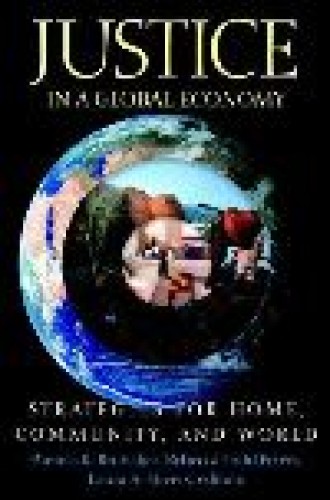Justice in a Global Economy
Christians can be quite good at feeling guilty. We feel guilty if we commute to work by car, but we also feel guilty if we don’t earn enough money to buy a house in the suburbs with a yard for our kids to play in. We feel guilty if we buy jeans manufactured cheaply in sweatshops, but we feel guilty if we spend money on expensive clothes that could otherwise be spent on charity toward others.
Not surprisingly, this kind of guilt tends to be the privilege of the few—those educated, well-intentioned people of some means who live in the industrialized world, where we have the luxury of almost unlimited economic choices. Ironically, awareness of our position near the top of the globalized consumer chain can lead many Christians to a paralyzing—one might even say convenient—sense of hopelessness in the face of the apparently impervious machine that we think of as the global economy.
The 12 authors who contributed to Justice in a Global Economy (most of them professors and some of them also Protestant clergy) are doing their part to challenge this kind of convenient paralysis. They start with the conviction that the world’s poor and oppressed cannot afford the inaction of people of good will who believe that there is nothing they can do to resist injustice. Also, the authors reject the notion that the market is a self-perpetuating machine and instead remind us that markets are made up of human beings who actively make choices on the basis of their values. First and foremost, these writers offer assurance that there are some things individuals and congregations can do to change the world—and they provide concrete examples.
The chapters are organized according to three types of strategies—strategies for households, strategies for communities and public policies strategies—for combating the dominant version of neoliberalism that has largely shaped today’s global economy. Alternative economic practices suggested for households include supporting local agriculture, engaging in mindful eating and other consumption, and creating just conditions for household laborers. Strategies for communities and congregations involve cultivating a sense of rootedness to place, standing up to corporations and insisting that they be sensitive to community needs, creating community development organizations or offering services to local people, and being attentive to the particular needs of different communities (one size does not fit all). Finally, public policy strategies include promoting solidarity with migrants (a timely topic for the 2008 election campaigns); shifting policy and institutional emphases toward justice, sustainability and fair trade; and changing the terms of public argument—for example, avoiding general categories such as “the poor” and “moral values” and using more particular terms that do justice to particular situations and people.
In contrast to more scholarly works on the topic of Christian ethics and globalization (such as editor Peters’s prize-winning 2004 work, In Search of the Good Life: The Ethics of Globalization), Justice in a Global Economy approaches the same subject matter while remaining accessible to a wide audience. Each short chapter is followed by a list of discussion questions, and each provides a brief bibliography of books and Web sites that interested readers can go to for more information.
This book may be helpful to the motivated individual, but it will prove especially fruitful in the context of groups or congregations willing to put some time and effort into communal ethical discernment. Those who do so (perhaps over the course of several months or in a yearlong study) will surely find themselves able to gradually shake off their privileged paralysis and then, little by little, courageously change their economic and political habits with an eye toward justice for their neighbors both near and far.





